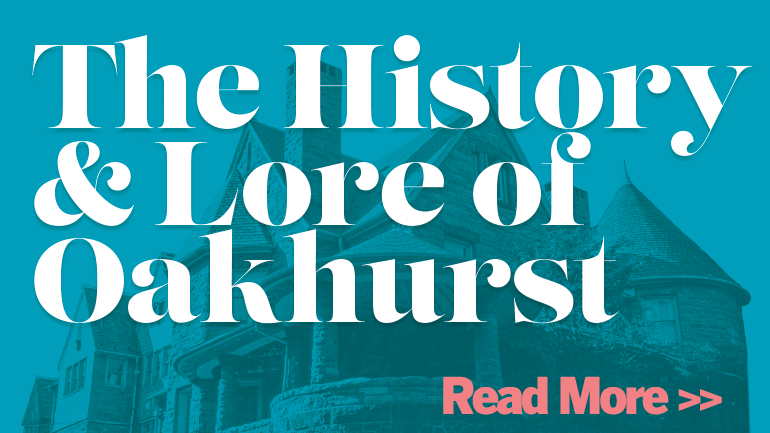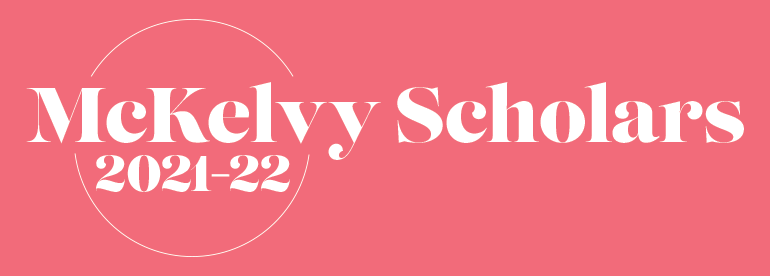Under One Roof
Tucked away on a scenic perch overlooking the Delaware River, just blocks off campus, is a granite, shingle, and slate stately 19th-century mansion that pulsates with the day-to-day routines of 20 Lafayette students.
Like any college residence, there are the things you would expect: Walls of its third- and fourth-floor bedrooms are plastered with representations of modern popular culture, while the beds, tables, and floors throughout are strewn with laptops, books, and personal mementos.
There is also the unexpected, however. The spacious living room and parlor—with their elaborate woodworking, original flooring, and cement mantelpiece and fireplace—are filled with mismatched chairs lined up for Sunday night dinner discussions, when voices reverberate off every nook and cranny of the architectural showpiece home.
It is known as McKelvy House, named for Francis McKelvy, a Lafayette College Trustee from 1933 until his death in 1952 (and who had purchased the home, then known as Oakhurst, in 1914). The house and grounds were gifted to the College in 1960 by his daughter, Louise McKelvy, and a plan was put in place (by then-dean Charles C. Cole) for the estate to provide space for “students of high ability and creativity to work at their own pace in an atmosphere conducive to high achievement.”
A year later, the Scholars program and McKelvy House welcomed their first group of 20 students and one faculty adviser, whose residential apartment to this day includes the original formal dining room and kitchen.
For six decades—and long before many institutions of higher education adopted the premise of “learning communities” in the ’90s—the program has helped students from all walks of life find a place to channel their academic and extracurricular interests. More than that, however, it has allowed these students to build connections and an unexpected family during formative years when participation—or lack thereof—can truly alter the college experience for worse or for better.
At the majority of colleges and universities, living communities are often touted as a place to connect with other students who share worldviews and similar interests. McKelvy Scholars, however, thrive on learning and living with people whose views and life experiences differ from their own. This helps the students curate how to work with each other to build solutions and work across narrative differences.
The program also provides a place where participants can take discussions or ideas that were formulated in the classroom and expand upon them over their days, weeks, months, or even years with the program. In this way, McKelvy Scholars become co-creators of knowledge and understanding.
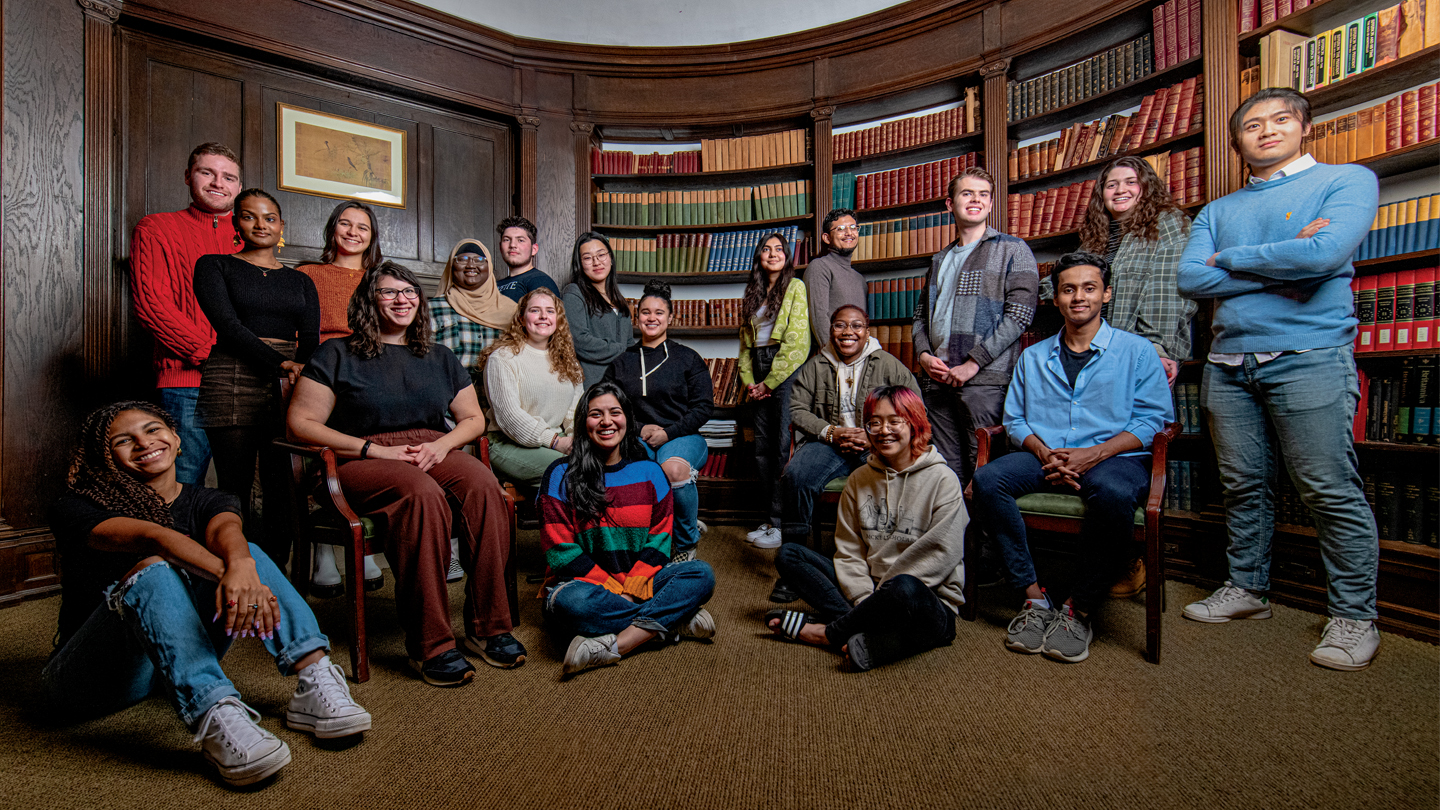
(L-R) Cori Davis, Charles Mirsky, Saide Singh, Nat Schmit, Angela Bell, Fatimata Cham, Lawrence Narotsky, Heather Aikman, Youmin Park (standing), Jordan Shaibani (on ground), Destiny Ortiz Fernandez, Onab Falak, Alexis Ruiz (standing), Xavier Walker (chair), Shirley Liu (on ground), Stefano Mancini, Sakib Shahriar Arnob, Abigail Schaus, and Weizhou Ding. Members in the 21-22 cohort who are not pictured: Viki Zay (December graduate), Nada Awadalla (abroad), Anastacia Negron (abroad), Zihao Ding (abroad), Mariatou Coulibaly
“When I went to one of my first McKelvy discussions, it was the discussion that made me want to live in the house. It was about transportation issues in New York City. I’m from New York, so I knew a lot about the topic. A lot of the questions that came up were, ‘How can they make it more accessible?’ or ‘How does it impact poverty and homelessness in the city?’” recalls Fatimata Cham ’23. “The conversation just continued on and on, and it was so intriguing. I ended up learning so much. You can’t replicate that exact experience inside of the classroom, where there’s a limited amount of time to cover a topic.”
Tackling the tough topics
Civic engagement. Food and gender. Malpractice in gynecology. Planning for the impending climate disaster. Personal finance. Drug use on college campuses. Sex education and reproductive justice. These are all topics that have been covered at McKelvy discussions over the last academic year—proof that the students involved embrace difficult dialogue because they know it can lead to perennial change.
Each week, two students choose the topic at hand and then serve as event leaders to moderate the ebb and flow of the conversation. Those topics are announced beforehand, so that other Scholars and members of the Lafayette community who would like to attend have the option to come prepared.
We’re all able to listen and discuss a variety of things, and bring our own understanding to those topics—which really makes individual interests stand out.
Saide Singh ’22
“Everyone was so open to discussions that were diverse, exciting, and world conscious. I discovered quickly that these were students who were engaged in topics of conversation that surpassed what I experienced in classrooms,” says Saide Singh ’22. “While we don’t agree on anything, really, we all have different perspectives. We’re all able to listen and discuss a variety of things, and bring our own understanding to those topics—which really makes individual interests stand out.”
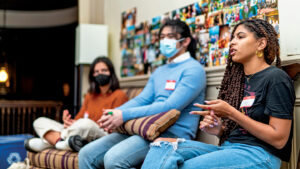
Cori Davis ’22, Weizhou (Josh) Ding ’23, and Natalie Schmit ’22 take part in a Sunday night dinner discussion at McKelvy House.
“I remember from my discussion, which was focused around drugs and legalization, people were disagreeing, but they were disagreeing productively. People were giving pushback, but it was all about finding a middle ground,” shares Alexis Ruiz ’22, whose own brother faced addiction and who has experienced the effects of the drug trade war between Texas and Mexico firsthand. “I brought the perspective of, ‘It’s fine to talk about legalization, but we also need to address rehabilitation. If you’re going to have access to drugs, you should also have access to the resources to get better.’ What makes McKelvy interesting is that people can bring their intellectual academic arguments and combine them with personal experiences.”
Current McKelvy Scholars—particularly seniors—are quick to recognize that they’ve been attending college during some emotionally charged times. They have seen these necessary conversations as not only a critical part of their Lafayette experience, but as opportunities for personal development and a chance to sharpen their listening and learning skills.
“As we prepare to lead our discussions, we are purposely creating questions that are not ‘yes or no.’ There is no ‘right’ answer. We really want to figure out, ‘What do you think about this, and why? Can you argue a point? Can you agree with someone and build off of it?’” explains Xavier Walker ’22. “When I disagree with people, it’s about principled critique. Oftentimes, when people disagree, it’s because they heard something that they didn’t. If you hear something you disagree with, you have to be able to explain why. And then you also have to be open to hearing other people’s ideas and opinions, and push back on that.”
Recording history
The McKelvy House study—a circular room boasting floor-to-ceiling bookshelves and window bench seating—doesn’t just play home to dusty old volumes and beautiful views of the property. Among its stacks of bound pages are paper time capsules capturing what the program has meant to many over the years.
For decades, McKelvy Scholars have documented their experiences with the program in two different volumes that have become tradition. One is the McKelvy Journal, which allows students to express anything that comes to mind about their time learning and living together. (To be clear, Scholars don’t have to take up residence in the house to be part of the program.) The other is The McKelvy Papers, which began in 1994 when Curlee Holton, then-assistant professor of art and faculty resident adviser of the house, urged program members to document their evening discussions in the form of a published book at the end of the academic year.
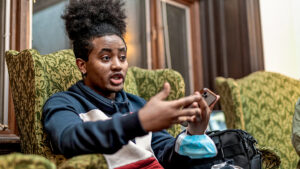
Matwos Tadesse ’24 was a guest at the McKelvy House discussion that took place on Feb. 6, 2022.
“During my sophomore year, we found these journals from the ’70s that actually seem like they could have been written today,” shares Natalie Schmit ’22. “They’re so interesting to read. People were writing to complain about their studies, or talking about the other people in the house. Then there were journals from the ’80s that made us laugh to read them, because people were really going at each other in their writing—but in a really good way. They’re funny to read, but it’s also really interesting to see how the community has evolved.”
The invitation-only concept of the program, with Scholars being nominated by professors, means that for the past six decades, many of the reflections in the journals have included sentiments on developing meaningful connections with faculty and heeding their advice when it comes to identifying opportunities that enhance the undergraduate experience.
One entry in the 1987 McKelvy Scholars Journal notes, “If you’re not here to share, to learn or open your mind to others, you are most definitely in the wrong place. As my professor most appropriately put it, this program should be what we want it to be. We can all learn something from each other.”
“What I treasure about McKelvy is the friendships I still have with my former Scholars from the House. It’s a really unique community of students and alums. There are many more special-interest housing options than there were in the 1970s at Lafayette, and I think at the heart of that is what a success McKelvy has been in modeling what a living and learning community can be,” reflects Caroline Lee, anthropology and sociology department head, and former McKelvy faculty resident adviser. “McKelvy’s focus on student-led deliberations on issues that matter to them has helped the program remain relevant through the decades.”
That those student-led deliberations now play out across pages that can be accessed at Skillman Library does much to reinforce the mission of the program.
The core of the program and the core of the house have not changed. It’s about respect for intelligence, respect for conversation, and respect
for other people’s opinions.
Cori Davis ’22
“The journal passages translate the way I feel about McKelvy and put it into words—and that is, the consistent thing that has occurred over all of these decades is that the core of the program and the core of the house have not changed,” says Cori Davis ’22. “It’s about respect for intelligence, respect for conversation, and respect for other people’s opinions.”
A secondary family
One of the cornerstones of any residential college is providing opportunities for its students to develop socially, psychologically, and academically—and naturally, that can occur more easily when students are engaged in the same programs with the same people. Like other themed academic communities, McKelvy Scholars have a deep-seated sense of honesty, mutual respect, and responsibility—and thrive on the positive interactions and collaboration of all program members.
In essence, they truly have become each other’s secondary family.
“When I step away from campus, it feels like I’m going home to my own community. If one of us goes into the living room or study, people just congregate and join in. People will quietly work there together. Or, some of us will hang out in the gardens together over a lunch break. There’s an idea of community that exists just outside of your room. It’s the small things, like saying ‘hi’ to each other when we all get back each day. You know you can go knock on anybody’s door,” says Singh. “It’s just the climate we’ve created here. Everyone is always up for adventures, and that’s what makes this experience so memorable.”
While those adventures include themed parties, service projects, and visits from other members of the College community, there are also numerous opportunities for junior and senior program participants to help sophomores navigate their way through their relatively new independence.
“I had older friends who went through the program and helped me when I first got here, and even now I can call them up and talk about McKelvy because it’s a shared experience,” says Walker. “Even though we had different Sunday discussions and different themes that came up through our time here, the format is the same. There’s a camaraderie and a familiarity that comes with this program. Someone may be several years ahead of you, but there’s that shared connection.”
There’s a camaraderie and a familiarity that comes with this program. Someone may be several years ahead of you, but there’s that shared connection.
Xavier Walker ’22
The students also appreciate the opportunity to get to better know their resident faculty adviser, Angela Bell, assistant professor of psychology, who joined the group in 2020. Faculty advisers not only provide encouragement and intellectual stimulation, but participate in gatherings and work closely with the College in terms of the academic components of the program.
“Since its inception, the stories of scholars and alumni share common themes of finding refuge and inclusion on campus. McKelvy provides a unique, dedicated space that enhances students’ educational prospects and allows them to cultivate a greater sense of self,” says Bell. “This has been a transformative community for so many and will continue to be for as long as scholars contribute. The program allows me to work directly with students who share my values but would not otherwise get to connect with on campus. Participating in weekly discussions without the pressures of grading has taught me to be a better listener and think more deeply about how students approach the world.”
Alumni reflections: ‘The cornerstone of my Lafayette experience’
Back in 1999, then-College archivist Diane Windham Shaw penned a letter to McKelvy alums, asking for their attendance at an anniversary gathering, or for their shared reflections if they were unable to make it back to Easton for the event. The letters that poured in are still filed in Skillman Library’s Special Collections and read like a recollection of an old friend.
While many of the memories shared center around the weekly discussions or the ability to get to know a professor better, there are also numerous nods to the way that McKelvy House made its residents feel—the sights, the sounds, the smells, and the acknowledgment that there was something about the entire experience that was just different:
I remember vividly how McKelvy House registered the seasons. How they lingered and how they changed. Every spring morning, I awoke to lilac-scented river breezes wafting through the windows into my room. By October, the trees lining the street that curved my way home all turned yellow, so that when sunlight hit them at just the right angle after lunchtime, I thought I’d found the path to El Dorado. For one very treasured year, I got to live in a mansion on the Delaware River, where the seasons made their presence felt, and the girl who had arrived in August mercifully bore faint resemblance to the woman who moved out in May.
Wendy Alice Way
Class of 1980, McKelvy Scholar, 1978-1979
Then there are the present-day recollections, which circle back to a singular common thread: The experiences of being a McKelvy Scholar were not only unique, but were also instrumental in molding once-young adults into who they’d become in the future.
“I have so many wonderful memories of my time there, from the awesome dinners and conversations we had, to the time my roommate tried to ‘upgrade’ the lights in the library over break. We loved exploring the house and hearing stories about how it once was,” says John O’Keefe ’96, vice president and CIO of Lafayette’s ITS Department. “One night, we hosted an event for alumni to return and learned about the hidden elevator and other secrets of the house. I’d also say my faculty advisers, Curlee Holton (for my first year) and Helena Silverstein (my second), were wonderful mentors who have played a critical role in shaping me into the person I am today.”
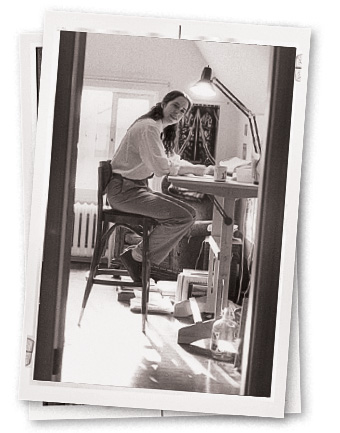
One-time McKelvy Scholar Mary Roth ’83 eventually became a Lafayette professor of civil and environmental engineering.
“There are two fond memories that come to mind when I think of my time as a McKelvy Scholar. First, I recall dancing with my friends and professors (Wendy Wilson-Fall and Rachel Goshgarian) as a Kenyan band performed in the McKelvy living room. I also remember countless late-night study sessions in the house’s library, the room’s air filled with the scent of old books and memories. One of these study sessions I was accompanied by a praying mantis, and other sessions, I veered from doing my work to engage in impromptu discussions with my housemates. Many of my best college memories happened within the McKelvy walls,” says Khadijah Akeem ’19.
“I lived in the house for three years (2017-20), and I consider my time there to be the cornerstone of my Lafayette experience. Given conversations I’ve had with co-workers and friends, McKelvy is unique not only on Lafayette’s campus but among other colleges and universities. Because of McKelvy, I made lifelong friends and relationships that I probably would not have made otherwise. I met my longtime boyfriend, Brad Au ’19, at McKelvy, so it will always be special to us for that reason,” says Rosario Rivera ’20.
“Life at McKelvy taught me to seek out relationships that challenge my perspective and worldview, as well as the importance of being a good listener. McKelvy is so valuable to the Lafayette community, as it provides a place for students to implement the valuable studies and critical thinking skills they learn every day,” recent graduate Ilias Phias ’21 recalls. “It was not just from the weekly Sunday discussions that I found myself thinking, learning, and growing, but also from late night while studying, afternoons spent in the lush gardens, or walks with housemates to or from campus. At McKelvy, I made memories and friendships that will certainly last a lifetime.”

